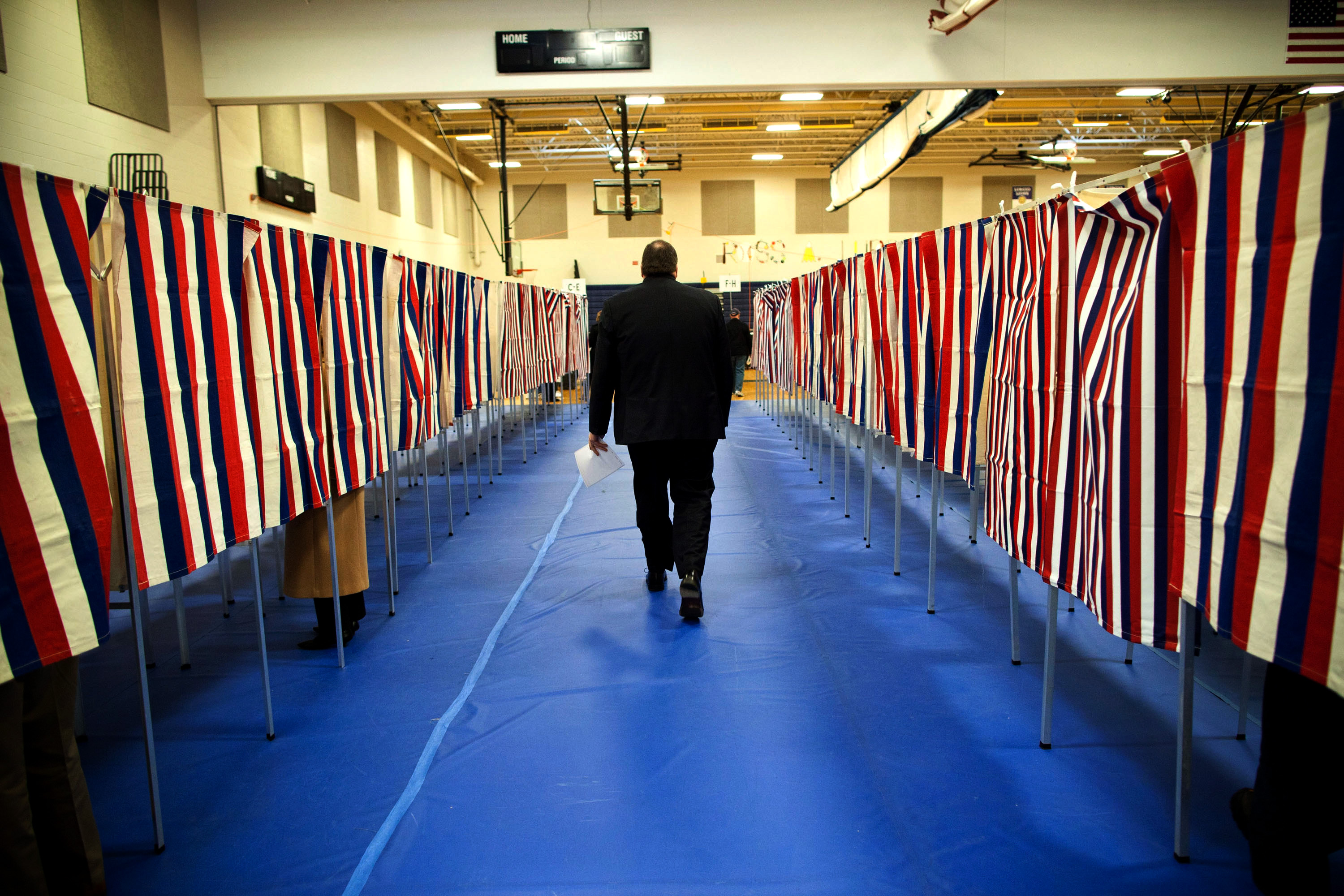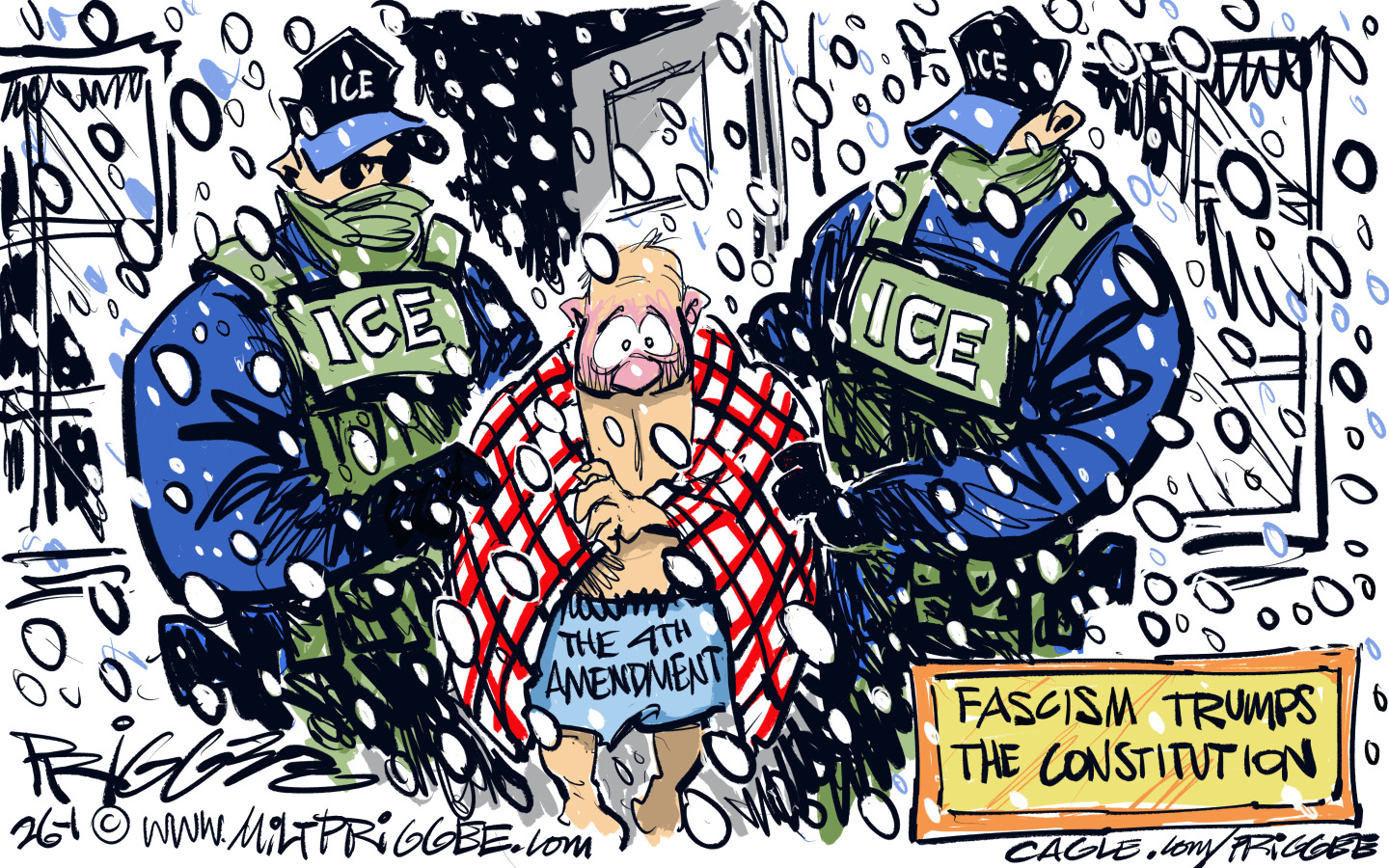There is no constitutional right to vote. There should be.
Here's why the Supreme Court can rule against voting rights and what can be done about it


You have no constitutional right to vote.
Such a bald statement undoubtedly will come as a surprise to some readers, who may have thought that voting is pretty fundamental to a democracy. And indeed there are a variety of places where the Constitution presumes such a right.
The 15th amendment forbids abridgment of that right on account of race, color, or previous condition of servitude. The 19th forbids abridgment on account of sex; the 24th on account of failure to pay a poll tax; and the 26th on account of age if the person in question is at least 18 years old. And Article IV of the Constitution requires the United States to guarantee to every state a republican form of government, which surely means that no state can do away with voting altogether.
The Week
Escape your echo chamber. Get the facts behind the news, plus analysis from multiple perspectives.

Sign up for The Week's Free Newsletters
From our morning news briefing to a weekly Good News Newsletter, get the best of The Week delivered directly to your inbox.
From our morning news briefing to a weekly Good News Newsletter, get the best of The Week delivered directly to your inbox.
Moreover, the United States Congress has repeatedly enacted legislation to prevent voter disenfranchisement. The best-known such law was the landmark Voting Rights Act of 1965, but further efforts to protect and expand the franchise were enacted through the National Voter Registration Act of 1993 (NVRA), which explicitly aimed to increase voter registration and generally ease participation in elections.
All of these constitutional provisions and subsequent legislation appear as if they were built on a right that lies at the foundation of our constitutional order. But that is not the case. The foundation simply isn't there. While the right to vote is presumed in a variety of ways, and, if it exists, may not be infringed for a variety of reasons, the right itself is never specified as such.
The provisions of the NVRA were specifically the subject of the most recent Supreme Court decision on voter rights, Husted v. Randolph Institute, which critics of the decision claim has effectively gutted the law. But the decision itself and the law it either gutted or simply enforced as written cannot be properly understood without recognizing the wide-ranging consequences of that curious constitutional omission.
At issue in the case was an Ohio law aiming to remove ineligible voters from the rolls by the following procedure: If a registered voter did not vote in a federal election in two years, the state would send a postcard to the person in question at their registered home address asking them to affirm their continued residence. If the person in question did not return the card, or otherwise establish the validity of their registration by, for example, updating their information electronically, nor vote in the subsequent four years, the state would presume they had moved and they would be removed from the voter rolls.
A free daily email with the biggest news stories of the day – and the best features from TheWeek.com
The NVRA explicitly allows for the removal of non-residents from voter rolls, and for sending registered voters a card that they have to send back in order to maintain their presence on the rolls. The Ohio law was assiduous in modeling itself on the requirements of the NVRA in that regard. But the NVRA also specifies that voters cannot be removed from the rolls for not voting. The question in the case was whether failure to vote in a single federal election was reasonable grounds for triggering the presumption of non-residence, and hence for sending the postcard, or whether such a provision amounted to, in effect, removing voters from the rolls merely for not having voted, something explicitly prohibited by the act.
Phrased that way, the question sounds narrowly technical, and something on which reasonable people might disagree. A strict reading of the wording of the statute, along with its 2002 amendments, might well seem to support the majority decision, written by Justice Samuel Alito and backed by the other conservative members of the Court, to uphold Ohio's ability to purge its rolls. Perhaps it is not reasonable to assume that people will respond to a postcard asking them to affirm their residence — but Congress, when it passed the NVRA, clearly thought otherwise. Perhaps it is not reasonable to assume that someone who hasn't voted might have moved — but the Ohio legislature thought otherwise. If the Court is not to substitute its judgments for those of the nation's lawmaking bodies, then surely it must allow the law to stand.
But such a conclusion only makes sense if it is a matter of constitutional indifference whether state legislatures enact laws whose predictable (and arguably intended) effect is to reduce the number of legitimately registered voters. And that's where the Constitution's silence on whether citizens actually have a right to vote comes into play.
If the right to vote was like the right to freely speak, or to peaceably assemble, or to exercise religion or to bear arms, then there would be a robust constitutional tradition debating whether this or that law constituted an undue burden on an enumerated right, independent of whether it traduced some other enabling statute. And even the most disfavored classes of persons would retain those rights.
For example, there is a robust history of litigation regarding the rights of prisoners to exercise their rights to free speech and free exercise of religion, in which the debate revolves around just how accommodating a prison needs to be to facilitate the exercise of these rights. By contrast, the overwhelming majority of states deny incarcerated felons the right to vote, and in most states those rights are not even automatically restored upon the completion of the felon's sentence, even though this disenfranchisement in no way facilitates the operation of the prison system in a safe and efficient manner. No balancing is necessary, because the right to vote is alienable in a way that our enumerated rights are not.
If there were a constitutional right to vote, the Ohio law would surely have been struck down as an unreasonable burden on that right. Indeed, it would be hard to articulate the state interest that would need to be balanced against the right to vote that might justify Ohio's procedure. Purging the rolls of infrequent voters is not even plausibly a good way to prevent fraud (a legitimate interest), and even effective ways to achieve that goal would have to be narrowly tailored so as not to burden an individual's right to vote, or place the burden on the state to prove the invalidity of a ballot post-facto. But if there is no right to vote as such, but rather a state right to establish rules for registration, then the only question really is a narrow one: Whether the state has successfully charted a course through the thicket of federal law, in order to pursue whatever ends it chooses.
Given the 5-4 vote to uphold the law, and the fact that Justice Alito had dissented previously even from the late Justice Antonin Scalia's 7-2 decision in Arizona v. Inter Tribal Council, the obvious take-home lesson for liberals and voting rights advocates is that control of the Supreme Court is essential to preserving voting rights. But this is a decidedly incomplete lesson to take. So long as the Constitution presumes that the franchise is a privilege rather than a right, something that states may legitimately seek to limit so long as they don't do so in certain specified ways or for certain explicit reasons, there will always be a legitimate basis for upholding laws that impose such limits. And a liberal court that struck down those laws could always be attacked, ironically, for being undemocratic in overturning the will of the people.
The core problem is the text of the Constitution itself. Amending the Constitution is extraordinarily difficult, but we've done it 27 times before. Even the process of organization and debate would force the other side to make arguments for why voting shouldn't be a fundamental right. And if the effort succeeded, the Constitution would finally say what most Americans probably assume it says already.
Noah Millman is a screenwriter and filmmaker, a political columnist and a critic. From 2012 through 2017 he was a senior editor and featured blogger at The American Conservative. His work has also appeared in The New York Times Book Review, Politico, USA Today, The New Republic, The Weekly Standard, Foreign Policy, Modern Age, First Things, and the Jewish Review of Books, among other publications. Noah lives in Brooklyn with his wife and son.
-
 31 political cartoons for January 2026
31 political cartoons for January 2026Cartoons Editorial cartoonists take on Donald Trump, ICE, the World Economic Forum in Davos, Greenland and more
-
 Political cartoons for January 31
Political cartoons for January 31Cartoons Saturday's political cartoons include congressional spin, Obamacare subsidies, and more
-
 Syria’s Kurds: abandoned by their US ally
Syria’s Kurds: abandoned by their US allyTalking Point Ahmed al-Sharaa’s lightning offensive against Syrian Kurdistan belies his promise to respect the country’s ethnic minorities
-
 The billionaires’ wealth tax: a catastrophe for California?
The billionaires’ wealth tax: a catastrophe for California?Talking Point Peter Thiel and Larry Page preparing to change state residency
-
 Bari Weiss’ ‘60 Minutes’ scandal is about more than one report
Bari Weiss’ ‘60 Minutes’ scandal is about more than one reportIN THE SPOTLIGHT By blocking an approved segment on a controversial prison holding US deportees in El Salvador, the editor-in-chief of CBS News has become the main story
-
 Has Zohran Mamdani shown the Democrats how to win again?
Has Zohran Mamdani shown the Democrats how to win again?Today’s Big Question New York City mayoral election touted as victory for left-wing populists but moderate centrist wins elsewhere present more complex path for Democratic Party
-
 Millions turn out for anti-Trump ‘No Kings’ rallies
Millions turn out for anti-Trump ‘No Kings’ ralliesSpeed Read An estimated 7 million people participated, 2 million more than at the first ‘No Kings’ protest in June
-
 Ghislaine Maxwell: angling for a Trump pardon
Ghislaine Maxwell: angling for a Trump pardonTalking Point Convicted sex trafficker's testimony could shed new light on president's links to Jeffrey Epstein
-
 The last words and final moments of 40 presidents
The last words and final moments of 40 presidentsThe Explainer Some are eloquent quotes worthy of the holders of the highest office in the nation, and others... aren't
-
 The JFK files: the truth at last?
The JFK files: the truth at last?In The Spotlight More than 64,000 previously classified documents relating the 1963 assassination of John F. Kennedy have been released by the Trump administration
-
 'Seriously, not literally': how should the world take Donald Trump?
'Seriously, not literally': how should the world take Donald Trump?Today's big question White House rhetoric and reality look likely to become increasingly blurred
